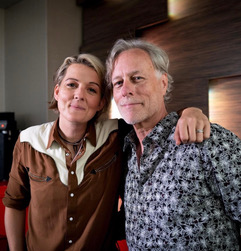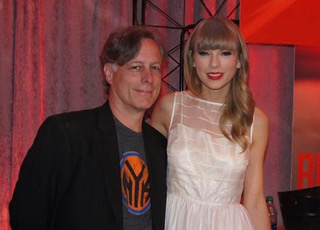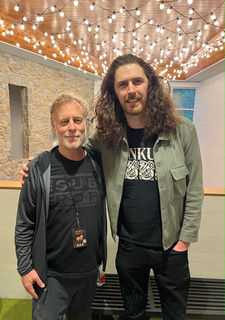In my 40+ year career, I’ve had the pleasure of interviewing a wide variety of artists, from Elvis Costello and Jack White to Beck and Brandi Carlile.
 Paragon clients have asked me to share some of my experiences interviewing artists and I’m going to preface what follows with apologies if it seems all too obvious. But, since I don’t know what your degree of experience is, I’ll just going cover the basics that I’ve learned over time and shared with the on-air talent that I’ve had the privilege to work with.
Paragon clients have asked me to share some of my experiences interviewing artists and I’m going to preface what follows with apologies if it seems all too obvious. But, since I don’t know what your degree of experience is, I’ll just going cover the basics that I’ve learned over time and shared with the on-air talent that I’ve had the privilege to work with.
Do your homework:
Job #1: Listen to the current release! Request an advance copy from the label if the album hasn’t dropped yet. The entire reason Artist X is talking to you right now is to promote their music! Many artists don’t particularly enjoy interviews. Establish your credibility immediately by demonstrating your awareness of the music. You can do this by commenting on a particular track (not necessarily the single) that might have stood out to you, maybe share why that track resonated with you, and prepare bullet point notes for topics you want to discuss. (I say “bullet points” because you don’t want to sound like you are reading questions off a page.)
Think about an “icebreaker.” What do you want to say, right off the bat? Just like any social situation, when you are meeting someone for the first time, you want to establish a genuine connection with the person you are speaking with.
Re-sets:
Remember to re-set often after your initial introduction. This may be the most common mistake I hear during artist interviews, when the host fails to identify the artist, setting, call letters and frequency.
Think of your interview in segments, 3-5 minutes in length and pre-record when possible. You have much more control when you can edit. This is probably not the time for an in-depth analysis of every track on the record. Strive for quick-hit soundbites that you can edit (if needed) and turn-around for air, quickly. Save the long-form stuff for your social media platforms.
 Listen!:
Listen!:
Obviously, it’s good to have notes or index cards and a general idea of what you wish to discuss. But stay in the moment and listen to the answers you get and what the artist is talking about. Often, we are distracted by thinking about the next question we want to pose—this has been my experience at times, particularly if you encounter an artist that is only giving you short answers—because they are road-weary, hungover, late for soundcheck, or just uncommunicative. Listen and focus on the conversational aspect during your interview– and don’t be afraid to abandon your agenda and go with the flow.
Taboo subjects. Sometimes, you will be told by a label rep or tour manager NOT to bring up a certain subject or topic. Generally, I would recommend you honor that request but sometimes there are ways around that, and often your audience (presumably) is tuning in precisely to hear the answer to that question you’ve been told not to ask!
If you decide to go down that road, save it for the end of the interview. It may be an awkward moment, but it also has a chance to be a very compelling moment and if you get lucky, it could go viral.
Have Fun With It:
Try word association. Source The Proust Questionnaire for questions. (What is your idea of perfect happiness? What is your greatest fear?) This approach depends heavily on who you are talking to. Light and frivolous works great with someone like Hozier, Jeff Tweedy, or Brandi Carlile. Thom Yorke? Maybe not so much.
 Steal Techniques From The Best Interviewers:
Steal Techniques From The Best Interviewers:
Who do you find inspiring as a host? Some of the most talented interviewers come from television because they have writers who research the subject (and, of course, contribute by creating interesting questions). Steven Colbert and John Stewart are so dedicated to their craft that they often read the books of authors they are talking to and watch the movies their guests star in, so it once again goes back to doing your homework and being prepared. Inspiration can be drawn from broadcast personalities in a diverse universe that includes anyone from Terry Gross to Howard Stern.
General:
Push for a one-on-one opportunity to talk to an artist and don’t settle for attending a press conference. Programming usually has enough clout to secure 10-15 minutes that are exclusive to your radio station.
Be technically prepared and ready to go when you get that window, but don’t expect things to be on time because they usually are not. It’s often a case of “hurry up and wait.” (I’ve spent countless hours killing time at a venue after being told, “Sorry, we’re running late.”)
Consider the app Voice Record Pro for your smartphone. It’s a good app with great sound and intuitive editing tools that virtually give you access to a studio in your pocket. It can be paired with inexpensive dual wireless microphones for enhanced quality but the built-in mic with this app is remarkably good, too.
Don’t forget to get photographs for social media, and station ID’s. Artists generally do better with pre-printed pages that are thoughtfully written—custom copy especially for them.
Final Thought: Never ask the following question, “How’s the tour going?”
__________________________________________________
Industry Links
Bob Waugh on The Art of the Interview – The Sands Report, September 12, 2024

Leave A Comment